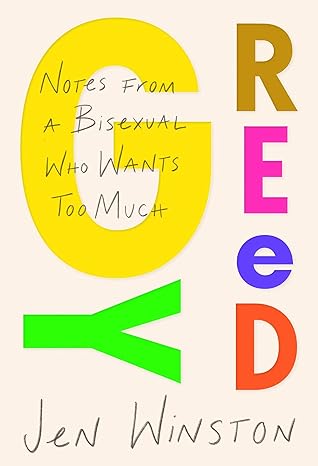More on this book
Community
Kindle Notes & Highlights
by
Jen Winston
Read between
February 1 - March 5, 2022
Sure, bisexuality means said queer truth can still encompass men, but let’s be real: If you keep hooking up with dudes, no one will believe you’re queer (least of all yourself).
“This book—would it be queer?” “Er, how so?” “Good art is always queer.”
Is bisexuality queer? In your head you know it is—another few years and you’ll realize you’re just as entitled to Chromatica Oreos as twinks are. But in your heart, you can’t deny that bisexuality has never felt queer enough. It’s never felt queer enough to talk about. It’s never felt queer enough to take up space. It’s never felt queer enough to lead you to community, or to show you who you are.
Your mind keeps replaying that dinner conversation—specifically his question about your book. At the time, you’d been ashamed to admit you didn’t know. But in hindsight, maybe your response said it all: Maybe confusion is as queer as it gets.
NOW THAT THAT’S out of the way, I’d like to thank you for buying this book! Algorithms have clearly determined you’re a bisexual, a social justice warrior, or a slut (if you’re lucky, all three)!
Bi people are oppressed by a binary system called “monosexism,” which suggests that everyone should either be straight or gay.
Saying “everyone is bisexual” is a microaggression because it implies bisexuality isn’t worth talking about.
If you’re worried that bi people will cheat on you, your issue is with monogamy—not bisexuality.
The problem isn’t promiscuity—it’s patriarchy, which vilifies sex and dismisses non-monogamy. The problem isn’t confusion—it’s binaries, which encourage us to make finite decisions (usually between two constructs that we never got to choose in the first place). The problem isn’t being greedy—it’s that systems function better when we don’t demand what we deserve.
Coming out doesn’t promise to heal everything, but it does promise community. After revealing your true self, you’re supposed to be rewarded with a support system—fellow queers who can do your makeup, administer your stick-and-pokes, and hold you accountable for misquoting Notes on Camp.
Arbitrary tropes like “bad at chairs” wouldn’t stick to bi people if we weren’t so eager to embrace them.
As individuals, bi people are not perfect—many of us contribute to the same systemic issues and perpetuate the same harmful ideas. But we don’t really exist as a collective, and while that’s generally infuriating, I’m relieved it makes our spaces almost too invisible to be exclusionary.
Given Sloane’s attractiveness (see: freckles, button-nose), Observation Team considers Jen high risk for confusion: She will never be sure whether she wants to be Sloane, kiss Sloane, or both.
Like so many aspects of modern empowerment, the self-love movement often filters through the male gaze. As a result, it comes with a subtext: If you’re gonna get yourself off, you’d better look hot while you do it.
(Note to my past self: if you’re surprised that ugliness is made up, just WAIT until you hear about money.)
Mingus’s work focuses on those who are most significantly impacted by systems of oppression, and while I would never compare my experience to theirs, I was still surprised to learn how relevant their experiences were to my own. I’d heard that all liberation was bound together, but now I could see it for myself: As long as ableism, fatphobia, transphobia, and white supremacy (et al) remained in place, none of us could feel comfortable in our own skin.
It took only a few months for New York to turn me into a cynic, and before I knew it I’d become a study on self-sabotage: I fantasized about meeting someone on the subway but also refused to make eye contact on the train.
Consider this your reminder: Memoir consists of recounted experiences, but by its nature, memory is unreliable. That means maybe—in someone else’s story—you actually know what you’re doing.)
a Portuguese word came to mind: saudade—feeling melancholy and nostalgic for something you love, but also feeling grateful for having experienced that love at all.
Faking an orgasm always hurts you more than it hurts the person you fake it for—it’s a self-imposed roadblock to the bliss you deserve.
Six months later, I was still single, Trump was still president, and Harvey Weinstein’s trial still hadn’t begun. People had gradually accepted the normalcy of this new era—collective outrage quieted to a hum, growing loud again only when news broke of anti-trans legislation, a heartbeat bill, or a xenophobic idea that would imminently be written into law. Injustice felt like dull, constant back pain: Unless our sciatic nerve was acting up, we simply learned to live with it.


